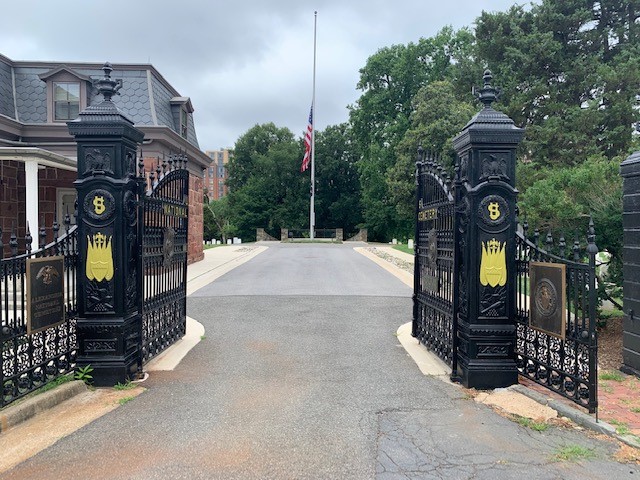Introduction Discover the untold story of courage, sacrifice, and the fight for equality at Alexandria National Cemetery. This hallowed ground isn’t just a final resting place for Civil War soldiers; it’s a powerful testament to the bravery of the United States Colored Troops (USCT) both on and off the battlefield. From their valiant efforts at […]
Tag: Civil War
American Civil War
Introduction Park Agnew, a name synonymous with Alexandria’s industrial growth and political dynamism, left an indelible mark on the city’s history. Born in 1847 as John Park Agnew, he became better known by his abbreviated moniker, Park Agnew. His life story is one of entrepreneurial success, civic leadership, and familial devotion. This article delves into […]
Born on April 6, 1820, Major George Duffey was a third-generation silversmith in Alexandria and lived until July 10, 1895. He lies at rest in The Methodist Protestant Cemetery. His grandfather, John Duffey, was responsible for crafting the silver trowel used by President George Washington on September 18, 1793, to lay the cornerstone of the […]
In the tumultuous days following President Lincoln’s assassination, a lesser-known tragedy unfolded on the Potomac River. As the nation grappled with the loss of its leader and the hunt for his killer intensified, a collision between two vessels resulted in the deaths of 87 people, including recently freed Union soldiers and civilian volunteers. This is […]
Situated at 1001 S. Washington Street, Alexandria, VA 22314, The Contrabands and Freemans Cemetery was founded in 1864 as a resting place for liberated individuals and escaped slaves who sought refuge in the town following the arrival of Federal troops on May 24, 1861. Contrabands of War On May 24, 1861, shortly after Virginia’s secession, […]
The Fugitive Slave Act of 1850, authored by James Mason, stands as one of the most contentious laws in American history. As a U.S. Senator from Virginia, Mason introduced this legislation as part of the Compromise of 1850, requiring the return of escaped slaves to their owners, even from free states. This act, formally known […]
Private Charles W. Needham is buried in Section A, Site 875, at the Alexandria National Cemetery. He suffered a fatal head injury during the Battle of Aldie, in a charge led by Captain Charles Francis Adams, the grandson and great-grandson of two American Presidents. Private Needham served in the 1st Massachusetts Cavalry and enlisted at […]
Gazaway Bugg Lamar (October 3, 1798 – October 5, 1874) was a prominent figure in the American business landscape of the 19th century, hailing from Georgia. His legacy is etched in various entrepreneurial pursuits, spanning banking, cotton trading, shipbuilding, and steamship technology innovation. Born and initially raised in Augusta, Georgia, Lamar’s business acumen started to […]
“I have seen Him in the Watch-fires of a Hundred Circling Camps!” Following the Union’s defeat at the First Bull Run (or Manassas) on July 21, 1861, they embarked on an ambitious project to safeguard their capital city in the event of a Confederate attack. They initiated the construction of a formidable defensive line comprising […]
On January 1, 1863, President Abraham Lincoln held a New Year’s Day Reception at the White House. He shook so many hands of the dignitaries, officials, and members of the general public who attended that afterward, he was afraid his hands would shake when signing The Emancipation Proclamation later that day. The proclamation changed the […]
Buried in Alexandria, Virginia’s Presbyterian Cemetery, is Samuel Richard Johnston (March 16, 1833 – December 24, 1899), who some blame for Lee’s defeat at Gettysburg. Born at West Grove Johnston was born in a place called West Grove. Now that place is the location of Belle Haven Golf Course and Country Club. West Grove was […]
The Lee-Fendall House Legacy Philip Richard Fendall II, born on December 18, 1794, and passing on February 16, 1868, was a significant figure in American history. He spent his formative years in the Lee-Fendall House, a historic residence built by his father, Philip Richard Fendall, in 1785. This house stands as a testament to the […]
When Marion Isabelle Twiggs, the daughter of United States Army General David E. Twiggs, the commander of the United States forces in Texas, first met one of his staff officers, Colonel Abraham C. Myers, she immediately fell in love, sparking a romance that would leave a legacy in the naming of Fort Myers, Florida. Shortly […]
Wilmer McLean (May 3, 1814 – June 5, 1882) Introduction The life and homes of Wilmer McLean are deeply intertwined with the American Civil War’s pivotal moments. From the first shots at Yorkshire to the final surrender at Appomattox Courthouse, McLean’s residences bore witness to the war’s profound impact on the nation. The McLean Legacy: […]

The Alexandria National Cemetery, originally called the Soldiers Cemetery, has over 4300 burials, including the graves of 249 United States Color Troops (U.S.C.T) who served in the Civil War. The cemetery is one of the first Federal cemeteries where white and black soldiers are buried together per a military order of 1864. The Alexandria National […]